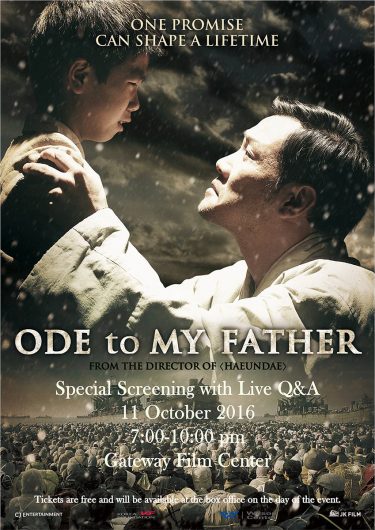
“Ode to My Father” is set to screen at the Gateway Film Center on Oct. 11. Credit: Courtesy of Mitchell Lerner
On Dec. 22, 1950, aboard freighter SS Meredith Victory, the US Navy performed the largest land evacuation by a single ship. The story of the Hungnam Evacuation, which rescued almost 100,000 North Koreans in total during the Korean War, will be presented Tuesday during a screening of the film, “Ode to My Father,” at The Gateway Film Center.
Although the SS Meredith Victory was a cargo ship built for only 12 passengers, it carried 14,000 civilians to freedom in South Korea, said James Person, editor of the North Korea International Documentation Project. Person is responsible for bringing the film to colleges across America. He said the event is a great way to introduce people to Korean culture and history.
“This is a perfect film for capturing the last 70 years of heartbreak and hardship for the Korean people and (it) just shows how much they’ve overcome to achieve what they have today,” Person said. “You see the determination of these people to make something great and to really improve (and) never to look back and just march forward.”
The evening will begin with a reception with traditional Korean food, and continue with a lecture detailing the events the film depicts, Person said. One guest speaker is SS Meredith Victory crew member and Navy veteran Admiral J. Robert Lunney.
Lunney said the SS Meredith Victory was one of the last ships out of the port as the Chinese and North Koreans rapidly closed in on the city of Hungnam.
“We had to navigate through a heavy minefield with the 14,000 refugees that we had loaded and we were able to get them safely down to (Busan) in the south,” he said. “Meanwhile five women gave birth to babies. We had five babies born on the ship en route from Hungnam to (Busan).”
Lunney was quick to praise the refugees, whom he called “the true heroes.”
“The one thing that impressed us was the great sacrifice and the courage of these people, these Korean people from the north, who were fleeing communism and seeking freedom,” he said. “It was bitter cold up there at the time they left their homes. They left their villages, many of them with connections to their communities for hundreds of years, but they were willing to obtain freedom and that is the message that we observed with all of them.”
The journey of the refugee is the central focus of “Ode to My Father.” The film depicts modern Korean history through the life of an average man and the events he experiences, including the Hungnam Evacuation and Korean War.
Several of the refugee survivors will be in attendance at the Gateway event, something that is unique to the OSU screening. One such survivor, who will be in attendance, is Dong-Hyuck Won, who was 14 years old during the Hungnam Evacuation.
Won described his journey traveling from his home in the mountainside, through the heavy snow of winter, to get to the Busan port and board a rescue ship.
“One night, it was Dec. 22, the whole city was burning by a bombing … and the missionary people came to our side and said ‘please line up and follow us,’ so we just (lined) up and through the burning city we were running to the harbor,” Won said. “We had never (seen) such a big ship … It was a cargo ship and not a passenger ship, and 14,000 people were pushed in like cargo.”
Although separated from his family, most of whom remained in North Korea and are now deceased, Won said he feels lucky to have been rescued. He expressed gratitude for all the Navy veterans who put their lives on the line to protect the refugees.
Associate professor of history and director of the Institute for Korean Studies, Mitchell Lerner, encourages students to attend the event for both the film’s strong storyline as well as the culturally immersive reception.
“The movie itself is an amazing story that really tells the story of modern Korea and its struggle to survive in the Cold War and through its own modernization process,” Lerner said.
The event is free to the general public and will begin with the reception at 6 p.m. and “Ode to My Father” screening at 7 p.m.


